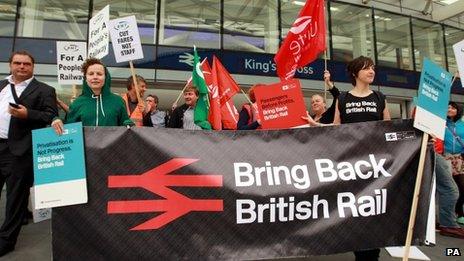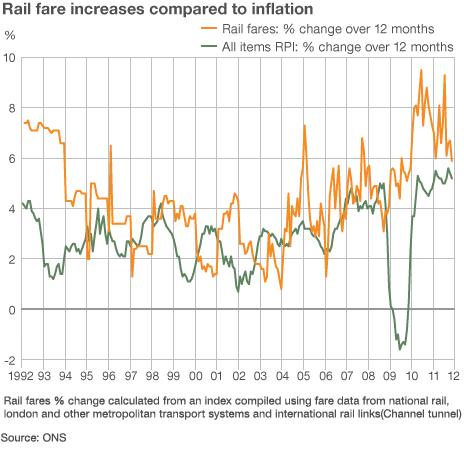Rail fares 'to rise by 4.1%' in England as unions protest
- Published
- comments

Campaigners protested at stations across England
Commuters in England face an average 4.1% rise in regulated rail fares - including season tickets - next year.
Ministers say the rises will pay for investment in the rail network.
Trade unions organised protests at stations around the country and called for the rail network to be returned to public ownership.
Labour said those travelling on busy lines could be "clobbered" with rises of up to 9.1% as train companies add extra increases to some tickets.
Regulated fares are those the government controls, and include season tickets, "anytime" single tickets around major cities, and off-peak inter-city return tickets.
They will go up by an average of inflation - as measured by the retail prices index (RPI) for July - plus 1%.
The RPI fell from 3.3% to 3.1% in July, according to official statistics, external.

Train companies can vary regulated fares by up to 5% above the average 4.1% rise, but fares that go up by more than the average must be balanced by others that rise by less or fall.
David Sidebottom, from watchdog Passenger Focus, said travellers would "shrug wearily" at the news of another rise, adding: "It is crucial... more trains arrive on time, investment in future improvements continues and the basic promises the industry make are delivered."
Some campaigners say rail tickets are becoming increasingly unaffordable as price rises outstrip wages.
"It's really starting to eat into people's incomes," Richard Hebditch, from the Campaign for Better Transport said.
Meanwhile, the TUC organised demonstrations at almost 50 stations around the country.
General secretary Frances O'Grady said passengers were "lining the pockets of the shareholders of private rail companies" and the government should look at renationalising the railways.
Train operating companies in Scotland have their prices capped at the rate of inflation, while there is no rise planned in Northern Ireland and the Welsh government has yet to decide.
'Hugely expensive'
Michael Roberts, chief executive of the Association of Train Operating Companies, said the rises were vital to maintain and upgrade the network.
"Someone has to pay for that investment," he told BBC Breakfast.
Patrick McLoughlin, the transport secretary, said: "Running the railways is a hugely expensive business. The taxpayer overall is still putting in huge amounts of money... and I'm afraid the passenger also has to make his contribution."
He said there had been a "vast growth" in passenger numbers, adding: "What we're doing is driving up the levels of investment so people get more reliable train services and better facilities as well."
But shadow transport secretary Maria Eagle said Labour would stop train companies "fiddling the cap" and adding 5% on popular routes.
"It gives a big advantage to train companies to maximise their revenues whilst leaving commuters who have no other realistic choice having to face this cost of living crisis that just keeps getting worse and worse and worse."
One commuter, Jennifer Burke, told the BBC: "You're sitting with your salary which hasn't changed for a couple of years now... Your train journey goes up and sometimes the quality's just getting less and less."
- Published13 August 2013
- Published11 July 2013
- Published13 August 2013
- Published13 August 2013